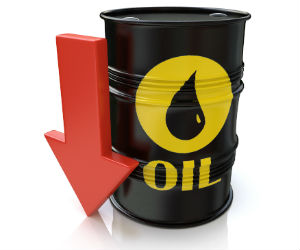Oil prices are at unprecedented low levels, but security in the oil and gas vertical is expected to grow at a CAGR of about 5 percent from 2015 through 2020.
Oil prices are at unprecedented low levels, but security market in the oil and gas vertical is expected to grow at a CAGR of about 5 percent from 2015 through 2020. Several reasons contribute to this, the most important being the need to reduce operational expenses and manage concerns of terrorism and geopolitical tensions. In this article we take a look at the changing oil and gas market landscape and how it impacts the security industry.
The history of oil and gas industry is fraught with booms and busts. But when prices of crude dropped about a half in 2014, there was little doubt the industry was witnessing a radical shift. Reasons for the price-fall then were several, including lower U.S. imports and increased production from Canada and Iraq. More than a year later, the price of global benchmark Brent Crude and the US benchmark WTI remain at around US$40 per barrel, way below the $90s and $100s seen over the last decade.
Predictably the price-drop and subsequent losses have prompted damage control measures from oil companies. Reports suggest over 200,000 people have been laid off and investments in infrastructure and equipment have been cut down.
The last part, decline in infrastructure investments, is what mainly concerns the security industry. But unlike sectors like oil-production equipment makers, the security industry is seeing more opportunities in the situation. Efforts to increase operational efficiency and secure against concerns like terrorism are expected to boost oil and gas security market in the coming years.
Downturn prompts need for cost-saving measures
 Oil-price dip has increased need for
Oil-price dip has increased need for
cost-effecient solutions.
One of the major reasons for continued low oil prices is that the production remains strong despite oversupply. This means in traditional oil production hubs like the Middle East, site expansions and project developments continue to take place. In fact, according to Johnny Carni, VP of Marketing and Sales at Controp Precision Technologies, even regions like the Mediterranean continue to see rise in oil and gas installations. What has changed though is how oil producers give importance to controlling the costs by protecting the assets.
This is where the good news begins for the security industry.
Synectics is one of the major security solution providers with a strong focus on the oil and gas vertical. According to Steven J Williams, Manager of Business Development in the Americas at Synectics, the company is able to take full advantage of the changing landscape by offering integrated security solutions that support operational efficiency.
“By consolidating multi-system data in a single environment, significant savings (both in money and manpower) can be achieved over the resources required to individually monitor and control a suite of site systems,” Williams said. “As a result more and more projects are deploying command and control solutions that both unify and ‘make sense’ of data from multiple sources.”
He added that such intelligent integrated systems, along with modern camera technology, enables remote monitoring of security and processes at locations that are difficult and costly to continuously monitor in-person. This keeps staffing costs low and aids employee safety.
Such an approach to lower the TCO and improve ROI is the general direction that security solutions providers are stressing in the situation. Patrick Looijmans, Solution Consultant for Business Development in the EMEA at
Bosch Security Systems echoed similar thoughts as he explained how their products aid in improving business processes.
“By using cameras as ‘smart sensors’ we can collect and offer valuable data which can be used to streamline operations or put focus on those areas which require most attention,” Looijmans said, adding that the company’s video analytics segment also plays a key role in the solutions.
Focus on unique solutions
There are also some companies that claim to provide certain unique solutions that help customers ensure comprehensive security without burning a hole in their pocket. AMG Systems is one among them.
“We do have some unique ‘hybrid’ (integrated analogue/IP) solutions which allow clients a means of combining multiple networks on the same transmission backbone, hence reducing both infrastructure and support costs,” said Sara Fisher, Business Development Director at
AMG Systems. “With this approach clients also have the opportunity to migrate to IP in a transitional way (keeping the existing analogue cameras/devices running alongside new IP cameras etc.), reducing large capital outlays.”
Amit Mattatia, President and CEO at Opgal Optronic Industries, stressed the importance of unique solutions that can drive the costs down, citing the example of his company’s uncooled long range multi-sensor PTZ system that combines unique algorithms with thermal detection and optics. To him, this systems is proof that long-range high performance detection is possible without huge costs.
The situation outside Middle East
 Although Middle East is the traditional oil
Although Middle East is the traditional oil
production hub, the price dip has global
ramifications.
Industry players have pointed out that the change in oil industry is not just about Middle East, but other oil-producing regions as well. Michael von Hauff, CEO at Osprey Informatics, said that his company is seeing similar economic shifts in North American markets and that his company is ensuring steps to deal with them.
“We have placed a strong focus on our TCO advantages relative to competitive solutions - simple and fast installations, extreme bandwidth-efficiency for low data costs, remote system health monitoring and maintenance, and lower hardware and storage costs due to our cloud architecture,” von Hauff said. “In terms of ROI, we work with our customers to establish a business case based on labor optimization, reduced material losses and production disruptions, and improved response to leaks and spills.”
In fact, certain developments in North America are some of the key reasons behind the current oil-price dip. The so called “shale revolution” in U.S. has helped the country become self-reliant for its oil consumption, cutting its imports and reducing global demand. Shale oil production is the process of recovering oil and gas from shale rock through a technique known as hydraulic fracturing or fracking. While this is a threat for traditional oil producers, it offers a whole new opportunity for the security industry.
Terrorism and Related Concerns Boost Demand
 Concerns of terrorism have boosted
Concerns of terrorism have boosted
demand in the oil & gas sector.
A single major reason for increased government spending on security would be the widespread increase of terrorism concerns. This began with the 9/11 attacks which saw the rise of US defense and security spending by about 2 percent of GDP. In November, after the Paris attacks, UK announced it’d boost security spending. Reports suggest that France is also set to increase budgets for security.
Oil and gas facilities have always been a key target for terrorist groups as any disruption in such sites could undermine the internal stability of the countries they are fighting and economically weaken them.
According to a report from MarketsandMarkets, most of the physical assets at oil and gas installations are subject to terrorist and high-profile cyber-attacks. As the industry adapts new technologies for operations, the security requirements also widen.
“Various surveillance and monitoring techniques such as video surveillance, mass notification, and perimeter security can be instrumental in preventing security breaches as well as conducting effective audit trail,” the report read. “Workforces nowadays are increasingly using mobile devices while working on offshore rigs in remote areas. This has led to investments in network security by enterprises to keep their network infrastructure and communication lines robust and secure.”
Companies Bet on Demand to Grow
The oil and gas vertical is witnessing a radical shift. Traditional oil producers are in a tight spot, while traditional markets are giving way to emerging economies. Security solution providers are making efforts to adapt to this new situation too, with broad product line up and attempts at geographical expansion. Controp’s Carni said his company is focusing some of their attention to other regions outside their traditional strongholds.
“We have a lot of experience in offshore oil rigs security in the Mediterranean Sea and take part in several coastal surveillance and protection programs throughout Asia,” Carni said. “We are also focusing some of our attention to other security maritime requirements in North America and Africa for example.”
Going by the current outlook demand for security solutions in oil and gas vertical is on its way up. There are several questions on how the oil-price issue would play out in the coming years, but that wouldn’t in any way hurt the security industry. Solution providers may come under pressure to offer more cost-efficient products, but this would only encourage more investment in R&D and product innovation.